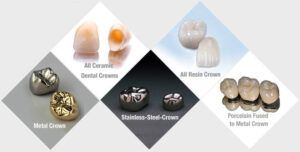
What is a dental crown?
A dental crown is a cap shaped like a tooth that is placed over a tooth to cover and restore its shape, size, strength, and appearance. Crowns are used to protect weak teeth from breaking, restore broken teeth, support teeth with large fillings, hold dental bridges in place, cover misshaped or discolored teeth, and cover dental implants. Crowns can be made from different materials like metals, ceramics, porcelain, and resin.
Why Might You Need a Dental Crown?
You might need a dental crown for many reasons:
Restoring a Damaged Tooth:
Crowns repair and restore broken, cracked, or worn-down teeth.
Decayed Teeth:
Crowns restore decayed teeth by providing protection, strength, and better looks.
Post-Root Canal Therapy:
After a root canal, crowns protect the tooth from fractures.
Cosmetic Reasons:
Crowns can improve the appearance of your smile.
Dental Implants:
Crowns placed on dental implants replace missing teeth.
Holding a Dental Bridge in Place: Crowns anchor a dental bridge to fill gaps created by missing teeth.
Types of Dental Crowns

Metal Crowns:
Metal Crown Made from gold, platinum, or cobalt-chromium.
Very durable and long-lasting.
Best for molars because of their metallic color and strength.
Porcelain-Fused-to-Metal (PFM) Crowns:
Have a metal base with a porcelain exterior.
Strong, durable, and look like natural teeth.
The metal gives strength, and the porcelain looks natural.
Disadvantage: The metal may show as a dark line at the gum line over time.
All-Ceramic or All-Porcelain Crowns:
Made entirely of ceramic or porcelain.
Best match for natural tooth color, ideal for front teeth.
Metal-free, good for people with metal allergies.
Zirconia Crowns:
Zirconia Crown Made from zirconium dioxide, a very strong type of ceramic.
Strong, durable, and look good.
“Compatible with living organisms and less prone to triggering allergic responses.”
Can be solid or layered with porcelain for a natural look.
The Dental Crown Procedure
The dental crown procedure usually has several steps:
First Visit:
Initial Examination and X-rays:
The dentist checks your tooth and takes x-rays to see the tooth’s roots and surrounding bone.
If the tooth is very decayed or at risk of infection, a root canal might be needed first.
Tooth Preparation:
The dentist numbs your teeth and nearby areas with local anesthesia.
The tooth is reshaped to make room for the crown, involving some removal of the tooth structure.
Impressions:
After reshaping, an impression of the tooth is taken using putty-like material or a digital scanner. These impressions are sent to a dental lab to make the custom crown.
Temporary Crown Placement:
A temporary crown is placed over the prepared tooth to protect it while the permanent crown is made.
Second Visit:
Removal of Temporary Crown:
The dentist takes off the temporary crown and checks if the permanent crown fits well and has the right color.
Fitting and Adjusting the Permanent Crown:
Adjustments are made to ensure the crown fits properly and aligns with your bite.
Cementing the Crown:
Once the fit is good, the crown is cemented onto the prepared tooth using dental adhesive. Excess cement is cleaned off, and the crown is polished.
Benefits of Dental Crowns
Improved Appearance:
Crowns cover discoloration, staining, or misshapen teeth, giving a natural and attractive look.
Restored tooth function:
Crowns restore the function of damaged or decayed teeth, allowing you to chew and bite properly.
Protection and Strength:
Crowns strengthen weak or cracked teeth and prevent further damage.
Durability:
High-quality crowns, especially metal or zirconia ones, are very durable and can last many years with proper care.
Comfort and Fit:
Custom-made to fit perfectly, crowns feel natural and comfortable, allowing you to speak and eat normally.
Caring for Your Dental Crown
Proper care of your dental crown is essential for its longevity and your overall oral health. Here are some tips:
Maintain Good Oral Hygiene:
It is advisable to brush your teeth a minimum of two times daily using toothpaste that contains fluoride.
Use a soft-bristled toothbrush to avoid damaging the crown or irritating your gums.
Floss every day to take out plaque and food bits from between your teeth and around the crown.
Avoid Hard and Sticky Foods:
Avoid biting into hard foods like ice, hard candies, and nuts, which can crack or damage the crown.
Avoid sticky foods like caramels and chewing gum, which can pull on the crown and loosen it.
Regular Dental Check-ups:
Visit Solitaire Family Dentistry regularly for check-ups and cleanings.
Your dentist can monitor the condition of the crown and address any issues early on.
Avoid Habits that Can Damage the Crown:
If you grind your teeth at night, consider using a night guard to protect your crown and other teeth.
Avoid chewing on pencils, pens, or other non-food items, which can damage the crown.
Conclusion:
Dental crowns offer a versatile and efficient solution for the restoration and protection of teeth.
damaged or decayed teeth. They provide you a numerous benefits, including
enhanced tooth function, improved aesthetics, and increased durability, and also
have an ability to support other dental treatments.
Proper care and regular dental checkups are essential to ensure longevity and
effectiveness of dental crowns, helps to maintain overall oral health and a
confident smile


